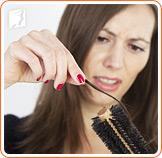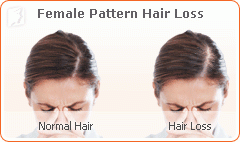While the most common symptoms of menopause include hot flashes and night sweats, some women can experience dramatic changes in scalp and facial hair. Though the causes of hair loss can be difficult to determine, given that hair thinning and hair loss in women occurs with natural aging. Most medical professionals recognize the role played by changing hormone levels as a result of menopause. Some women notice a little thinning, while others lose large patches, resulting in bald spots or requiring a wig.
What Are The Symptoms of Hair Loss?
Some degree of hair loss is normal; indeed, the average person loses about 100 hairs per day, so it can be difficult to determine how much hair loss should warrant concern. The following list indicates the most common symptoms of hair loss:

- Large amount of hair loss noticeable when washing
- Large clumps of hair left behind in the brush
- The scalp is itchy, oily, or red
- The appearance of bald patches
If you experience one or even a couple of these symptoms, it is likely that you are experiencing hair loss. Keep reading for more information about hair loss.
What Are The Causes of Hair Loss?
Hair loss as a result of menopause is typically due to fluctuating hormone levels. The two core hormones involved in hair growth are estrogen and testosterone. Estrogen helps the hair grow faster, stronger, and healthier as well as stay on the head for a longer time. A condition known as estrogenic alopecia, which causes hair loss, is most commonly linked with lowered estrogen levels and menopause.
Estrogen is not the only hormone associated with hair loss in menopause. Androgens tend to increase as estrogen levels decrease. This causes a condition known as androgenic alopecia, which is another form of hair loss.

- Certain medical treatments, such as chemotherapy
- Underlying medical conditions
- Nutritional deficiencies
- Constant twisting or pulling of the hair
What Hair Loss Solutions Are Available during Menopause?

In many cases, it is often not possible to reverse hair loss. Many products, which are scams, exist to take advantage of people and make money off of a hair growth product that ultimately doesn't work. If you are worried about hair loss, talk to your doctor or join a support group of people with similar experiences. It may be possible to prevent further hair loss; your physician can provide guidance on this.
Sources
- American Hair Loss Association. (2010). Treatment. Retrieved November 23, 2015, from http://www.americanhairloss.org/women_hair_loss/treatment.asp
- Dr. McNair, Trisha.(n.d). "Hair Loss". Retrieved from www.bbc.co.uk.American Hair Loss Association. (2010). Treatment. Retrieved November 23, 2015, from http://www.americanhairloss.org/women_hair_loss/treatment.asp
- National Health Service UK. (2012). Hair loss myth buster. Retrieved November 23, 2015, from http://www.nhs.uk/Tools/Documents/Hairloss%20myth%20buster.htm
- Mayo Clinic.(n.d). "Hair Loss". Retrieved from www.mayoclinic.com.



